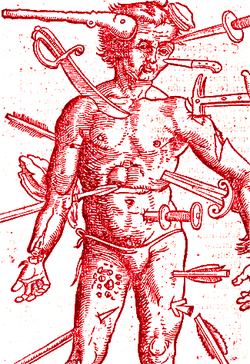Flutes of bone whistle empty
in my cave and I can play them
no longer. The offal and tired
hair balling itself into mockery
of me, tiny wolf cubs rolling
in a wasted pack, baying like
the wind stalking the weary kill.
I would even accept the rank
human flesh now, my teeth
cut past the sour scent of fear,
my heart unable to summon
strength to still this desperate
hunt. My lonely blood traces
its tired circuit, an empty path
I know I will find a man or
child wandering this morning.
An axe cannot bite this shadow.
Sated in the featherbed, I am
no more than the cotton, flannel,
feathers of a wolf transformed
into the reflection of this woman
inside me—her years, my gray
pelt; her smile, my carnassials,
canines and incisors. She sits
heavy on my belly as I vainly
try to pull her out onto my
ill-seeming face. My eyes now
a parlor we both wait in quietly
for release, paws in hand, heart
in mouth keeping things warm.
My jaws cannot drink away
the empty weight, the chalky bones
and blood and lives that drive me
to this stream, through the water
and in to drown myself with cool,
cool thirst quenching a need
of flesh and marrow, gristle
and hair, swallowing the others,
swallowing myself, the Earth,
stars, planets, comets, heat and
death, the tired spinning universe
of an old woman’s eyes, each day
passing in a child’s breath, this
pathogenic desire of my teeth.
Jon Tribble's poems have appeared in the anthologies Surreal South andWhere We Live: Illinois Poets, and in the Southeast Review, BlackZinnias, and Southern Indiana Review. He teaches at Southern IllinoisUniversity Carbondale, where he is the managing editor of Crab OrchardReview and the series editor of the Crab Orchard Award Series in Poetrypublished by SIU Press.

 RSS Feed
RSS Feed
